Protestors continue targeting retailers on Black Friday
By J.A. Salaam -Staff Writer- | Last updated: Nov 28, 2017 - 10:47:01 PMWhat's your opinion on this article?
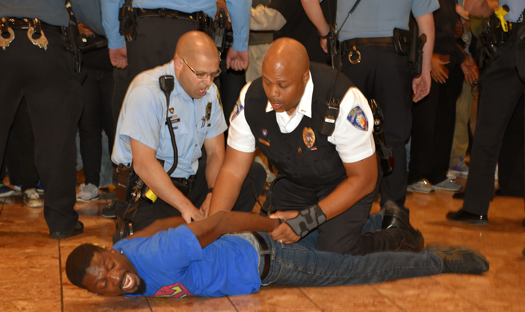
Missouri State Representative Bruce Franks Jr. was arrested during Black Friday Protests at the St. Louis Galleria Mall. Demonstrates called for a economic boycott of retail establishments to call attention to police involved shootings of Blacks. Photo: J. A. Salaam
|
RICHMOND HEIGHTS, Mo.—The busiest shopping weekend of the year, the day after Thanksgiving, was targeted by demonstrators in an affluent St. Louis suburb.
Black Friday was marked with an hour-and-a-half protest of about 100 activists, clergy and demonstrators from diverse ethnic backgrounds who marched alongside State Representative Bruce Franks, Jr., at St. Louis Galleria Mall.
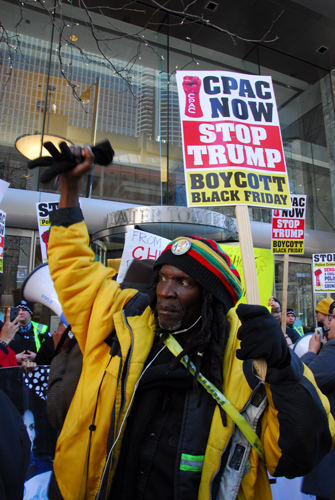
Demonstrator carries sign calling for a boycott of “Black Friday” in Chicago. Photos: Haroon Rajaee
|
The protest was a continuation of over 60 days of civil unrest in response to a September not guilty verdict exonerating former St. Louis police officer Jason Stockley of wrongdoing in the shooting death of Anthony Lamar Smith, a Black man, six years ago.
The police presence increased as the protestors walked around the mall chanting and disrupting the holiday shopping experience. “No Justice, No profit!” they chanted. “We shut it down!” chanted demonstrators.
“They can’t go through these days ‘business as usual’ knowing that we have an economically distressed community, knowing that our communities aren’t the way they are by accident and we’re not even just talking about police involved shooting,” said state Rep. Franks. “We’re talking about the system as a whole. Until folks start paying attention and start allocating those resources in the right spots and listening to the folks in the community as to how those resources should be allocated they can expect us” to protest, he said.
State Rep. Franks was among seven people arrested while aiding fellow protestors after police grabbed a man videotaping an officer. Two of the people arrested were innocent bystanders.
“We were doing what we came to do. It’s Black Friday and we wanted to let people know that we were there and part of the objective is when you hit the pockets, when you hit economics, folks start to listen. So, we were nonviolently protesting, we were making the noise; we were shutting the stores down,” explained Mr. Franks.
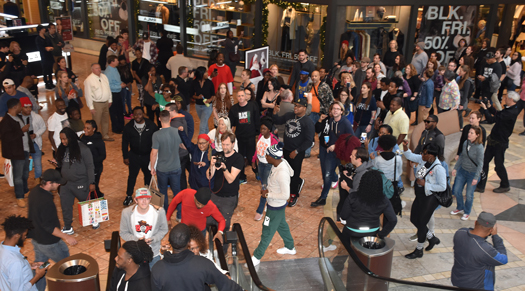
The Galleria Mall was the location of Black Friday protests on Nov. 24 near St. Louis, Mo. Photo: J. A. Salaam
|
“So, when we say, ‘take one take all’ that’s what we mean and touch one-touch all that’s what we mean,” said Mr. Franks.
Historically economic boycotting has been an effective tool for gaining attention of corporations and local governments to social injustices and inequities that continue permeating the fabric of American society.
The Reverend Jesse Jackson, civil rights leader and long-time activist, has spearheaded several boycotts over the past 45 years and continues to put pressure on large corporations to act equitably towards Blacks. Recently, he called for Blacks to boycott BMW because of their lack of inclusion on the corporate level.
“We’re boycotting them, because they’re boycotting us,” Rev. Jackson said in a statement posted to his Twitter account. “We are not seeking charity or generosity. We are seeking parity and reciprocity.”
In 2001 activists in Cincinnati, Ohio, called for a boycott of their city after the September 26, 2001, acquittal of Cincinnati police officer Stephen Roach, who killed 19-year-old Timothy Thomas on April 7 that year, which ignited major riots that devastated much of the city and the historical Black Over-the-Rhine neighborhood that sits just north of downtown.
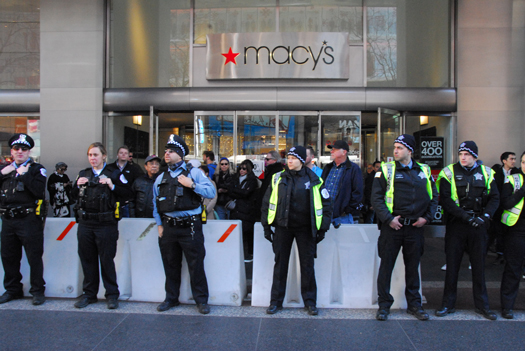
Chicago Police form a barrier in front of department store downtown. Photos: Haroon Rajaee
|
The call for an economic boycott of Black Friday and the holiday season was announced by Nation of Islam Minister Louis Farrakhan leading up to the 10.10.15 Justice or Else gathering in Washington, D.C., commemorating the 20th anniversary of the historic Million Man March.
“You’re either going to treat us right, or we’re going to withdraw from you our economic support. … We intend to boycott Christmas but not Jesus,” Minister Farrakhan said. “We choose not to spend dollars on Black Friday, Black Saturday, Black Sunday, and Black Monday. We are not going to spend our money for the rest of that year with those companies that we have traditionally spent our money on.”
The Minister explained like Dr. Martin Luther King Jr.’s call to “redistribute the pain” through economic withdrawal that Black people must not get caught up in the commercialism of the holiday season. Min. Farrakhan also called for Blacks to redirect their spending to Black-owned businesses.
Blacks during this time of year spend considerable money on things they can’t afford, all in the name of worshipping Jesus, and corporations press for sales during this time of year to take negative earnings in red ink to in-the-Black profits. Santa Claus has co-opted Jesus, Minister Farrakhan has noted, and he wants to promote a proper understanding and true love of Jesus.
According to the National Retail Federation (NRF), Black Friday and Cyber Monday spending sales, a four-day weekend, dropped 11 percent in 2014 to $50.9 billion from $57.4 billion in 2013. The federation blamed fewer online shoppers for the decline, but Black protestors shut down malls, shopping centers and businesses as part of demonstrations against police brutality, the killing of Black teenager Mike Brown in Ferguson, Mo., and failure to charge officers involved with a crime. Keeping with current trends, internet buyers outpaced brick-and-mortar shoppers, the NRF’s data showed, with 44 percent of the survey’s respondents buying online while 40 percent went to a store.
National Retail Federation data shows more than 108 million people shopped online over the Thanksgiving weekend, about five million more than last year. Meanwhile, 99 million people said they shopped in stores, down three million from last year.
Over the past several years, activists around the country have targeted retail establishments on Black Friday in various cities. This year was no exception though participation and the number of cities was less than in previous years.
A small group of protesters demonstrated near Water Tower Place in downtown Chicago on Black Friday, to continue calling attention to police misconduct and shootings.
The protests started in 2015, with the release of the Laquan McDonald shooting video that sparked days of protests on Chicago streets. It also led to protestors calling for boycotts of stores along Michigan Avenue that included blocking entrances to some stores.
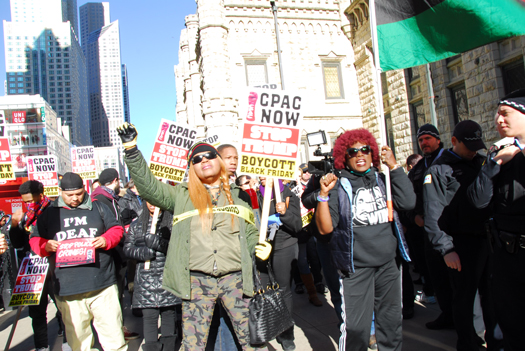
Demonstrators gathered in downtown Chicago on Nov. 24 known in the retail industry as Black Friday, the busiest shopping day of the year. Protesters convened to call attention to social injustices in the city and to disrupt retail business. Photos: Haroon Rajaee
|
This year’s protest wasn’t as big as those in years past and was largely concentrated to the front of Macy’s at Water Tower Place, reported the local WGN-TV news affiliate.
Many who were present were calling for more police accountability beyond body cameras and the newly-formed Civilian Office of Police Accountability (COPA), the station reported.
According to the East Bay Times, Native American activists and supporters protested at the Emeryville Shellmound located at the Bay Street Emeryville shopping center in California on Nov. 24. “The 18th annual Black Friday protest was held to bring attention to the desecration of the shellmound that is a sacred site to the Ohlone people. The large group of supporters held signs at the entrance and tried to discourage people from shopping at the center,” noted eastbaytimes.com.
In Seattle, a Christmas tree lighting ceremony was disrupted by a few hundred people that showed up to march and rally which remained mostly peaceful, noted KIRO 7 News.
Tensions rose between shoppers and protesters when the demonstrators purposely blocked the entrance to Nordstrom Rack in Westlake Center as they chanted “Black Lives Matter on Black Friday,” the news outlet reported.
Other protests on the biggest shopping day of the year centered on workers’ wages and rights and was not limited to the U.S. Workers at a half-dozen Amazon distribution centers in Germany and one in Italy walked off the job in a protest timed to coincide with Black Friday to demand better wages from the American online giant, reported the Associated Press.
Activists said they will continue to use boycotts as a means to fight for social equality and hit retailers where it hits hardest to get their point across.
For Ben Conover, he and others in St. Louis won’t stop boycotting until there are policies established on a local, state and national level that “aren’t racist that don’t significantly affect people of color.” Mr. Conover is White.
“We need to see police accountability, we need to see criminal justice reform, and we need to see development in a way that affects poverty in areas that is affecting people of color,” he said. (Final Call staff contributed to this report.)
INSIDE STORIES AND REVIEWS
-
-
About Harriett ... and the Negro Hollywood Road Show
By Rabiah Muhammad, Guest Columnist » Full Story -
Skepticism greets Jay-Z, NFL talk of inspiring change
By Bryan 18X Crawford and Richard B. Muhammad The Final Call Newspaper @TheFinalCall » Full Story -
The painful problem of Black girls and suicide
By Charlene Muhammad -National Correspondent- » Full Story -
Exploitation of Innocence - Report: Perceptions, policies hurting Black girls
By Charlene Muhammad -National Correspondent- » Full Story -
Big Ballin: Big ideas fuel a father’s Big Baller Brand and brash business sense
By Bryan Crawford -Contributing Writer- » Full Story






 Click Here Stay Connected!
Click Here Stay Connected!








